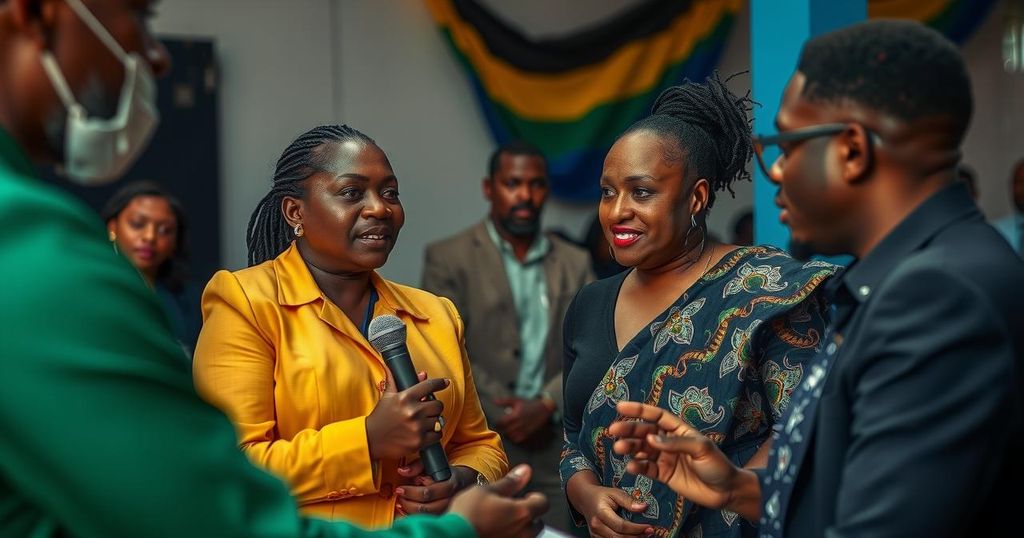Economic Recovery Central in Ghana’s Presidential Election Campaign

The 2024 Ghanaian presidential election features Vice President Mahamadu Bawumia and John Dramani Mahama as the main contenders, with economic recovery being the primary focus. Concerns about electoral transparency have emerged, alongside public frustration regarding unfulfilled promises, particularly in infrastructure. Both candidates have proposed different approaches for economic revitalization, while committing to a peaceful electoral process following the signing of a peace pact. Voting will occur on Saturday, with over 18 million citizens eligible to participate.
As Ghana approaches its presidential election, over 18 million eligible voters are prepared to cast their ballots for a new leader to guide the nation over the next four years. The electoral contest primarily centers on two candidates: Vice President Mahamadu Bawumia, representing the ruling New Patriotic Party (NPP), and John Dramani Mahama, the opposition leader from the National Democratic Congress (NDC), who previously served as president from 2013 to 2017. This marks Mahama’s third bid for the presidency after unsuccessful attempts in 2016 and 2020 against outgoing President Nana Akufo-Addo, who has now reached the constitutional limit of two terms.
With all 275 parliamentary seats also up for election, the Ghanaian Electoral Commission is under scrutiny regarding its transparency, prompting commissioning chairperson Jean Mensa to assure voters of credible and peaceful elections. Recent controversies surrounding media access to election result collation have led the commission to reconsider its policies towards greater inclusivity and transparency.
The sentiment among voters reflects a discontent with development outcomes, as many express frustration over unfulfilled electricity promises in their communities. Residents like Abdullai Jamal from Tamale convey a prevalent belief that political leaders have repeatedly neglected local infrastructure needs, leading to calls for a boycott of the elections until their grievances are addressed. Political analysts emphasize the importance of addressing voter concerns sincerely to avoid complacency among politicians.
Both Bawumia and Mahama are concentrating their campaign strategies on economic revitalization, a crucial issue amid Ghana’s ongoing fiscal difficulties, exacerbated by substantial national debt. Bawumia champions a digital skills initiative aimed at enhancing job creation for the youth, while Mahama critiques the current administration’s job creation statistics and advocates for a ’24-hour economy.’
Ghana has a history of relatively peaceful elections, and both candidates have signed a peace pact to assure voters of their commitment to stability post-election. Analysts have lauded Mahama’s decision to engage in the peace initiative, contrasting with his earlier refusal, suggesting that it could foster an atmosphere conducive to a fair electoral process. In this context, the 2024 election is positioned as a pivotal moment for national unity and development.
The forthcoming presidential election in Ghana represents a significant turning point for the nation, deeply rooting itself in economic challenges that resonate with the electorate. Economic hardship has been a recurring theme in recent political discourse, particularly in light of Ghana’s dealings with the International Monetary Fund due to its extensive debt, which currently exceeds $30 billion. The election features two prominent candidates: Mahamadu Bawumia, who aims to preserve the ruling party’s power, and John Dramani Mahama, who seeks to reclaim the presidency after previous electoral defeats. Electoral integrity and transparency are paramount concerns for voters, particularly in light of recent criticisms directed at the Electoral Commission’s operational transparency.
In summary, the impending 2024 election in Ghana encapsulates a pivotal moment defined by pressing economic concerns, public disillusionment with political promises, and a commitment to sustaining democratic principles. With both major candidates outlining their visions for economic rejuvenation, the electorate’s sentiments will significantly influence the election’s outcome. The peace agreement signed by candidates signifies a mutual understanding of the importance of a stable electoral process, promising to uphold Ghana’s democratic ethos amidst challenging fiscal realities. The electorate’s demands for accountability and service delivery will undoubtedly play a crucial role in determining the future leadership of Ghana.
Original Source: www.dw.com







